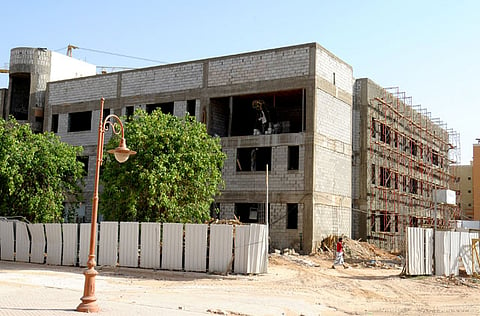Saudi building sector rises 156%
High-value projects, public housing to extend first-half gains

Dubai: Construction contracts awarded in Saudi Arabia during the first half of 2011 jumped 156 per cent to 84.2 billion riyals (Dh82.43 billion), up from 33 billion riyals in the corresponding period last year, according to a report.
Saudi Arabia's Construction Contracts Index (CCI) jumped to 205.3 points at the end of the first half of 2011, which is in stark contrast to the 80.36 points recorded in the corresponding period of 2010.
"This reflects the robustness of the construction industry over the past six months in particular as the initiatives from the annual budget and King Abdullah's royal decrees are currently being implemented," Saeed A. Al Shaikh, group chief economist of National Commercial Bank, said.
The 34.5 billion riyals in awarded contracts in the second quarter of 2011 represents a 43 per cent increase over the second quarter of 2010 when the value of awarded deals was 24.2 billion riyals, the report shows.
Recent reports indicate that the Middle East's largest economy is set to spend close to $100 billion (Dh367.19 billion) in boosting energy production over the next decade. This includes the construction of new power plants, expansion of existing ones and improving distribution systems across the country.
Affordability factor
King Abdullah Bin Abdul Aziz's recent pledge to spend 30 per cent of the kingdom's annual economic output (approximately $130 billion) on mass housing, job creation and training, unemployment benefits and a raft of other social and economic measures has been welcomed with great enthusiasm.
"However, as the supply and demand gap continues to widen in the housing sector, affordability remains the key deterrent for home ownership among Saudi nationals. Saudi Arabia has the largest real estate market in the GCC, but the least developed mortgage market and this has resulted in a shortage of owner-occupied residential housing, particularly at the lower end of the income scale," Mike Williams, senior director, Middle East research and consultancy manager at CB Richard Ellis, said.
With a rapidly growing population and an unemployment rate estimated at over 10 per cent among nationals, job creation, particularly in the private sector, is becoming an increasingly pressing issue for the government, he says.
At present only one in ten private sector jobs is held by a Saudi national.
"The government's focus to fulfil its citizens' demands for improved infrastructure capabilities played a significant role as more than 31 per cent of the value of awarded contracts during the second quarter was directed towards infrastructure related sectors. However, the residential real estate and power sectors garnered the highest percentage of the value of awarded contracts, accounting for 26 per cent and 23 per cent, respectively," Albara'a Al Wazir, senior economist at the National Commercial Bank, said.
Growth areas
In terms of geographical break-down, Riyadh accounted for the highest portion of awarded contracts by value, with a 26 per cent share. The Eastern Province accounted for 25 per cent of the value of awarded contracts with a big chunk of industrial, water and urban development contracts awarded.
The Makkah and Madinah regions accounted for 16 per cent and 15 per cent, respectively. The main contract awards in those regions were residential real estate projects in Jeddah and a power contract in Yanbu.
It is estimated that Saudi Arabia's vast appetite for energy will grow at 8 per cent annually from the current peak levels of 44,000 MW to triple the current offtake by 2032 at 121,000 MW. The plans include a thermal plant at the port of Yanbu on the Red Sea, with a capacity of 850 MW and a cost of $1.5 billion, and the Ras Al Zor point in the eastern region which will be the site of the world's largest power and desalination project with an estimated cost of about $2.4 billion. Completion of the project is expected by the end of 2013 when the plant will have a production capacity of 2,800 MW.
"This frenzied pace is expected to continue through sescond-half 2011 as there are numerous high-value projects that are in the bidding phases and are expected to be awarded in thir-quarter 2011. One such bid that is expected to be awarded is Phase 2 of the Haramain high-speed railway project at an estimated value of 30 billion riyals," said Al Shaikh.



